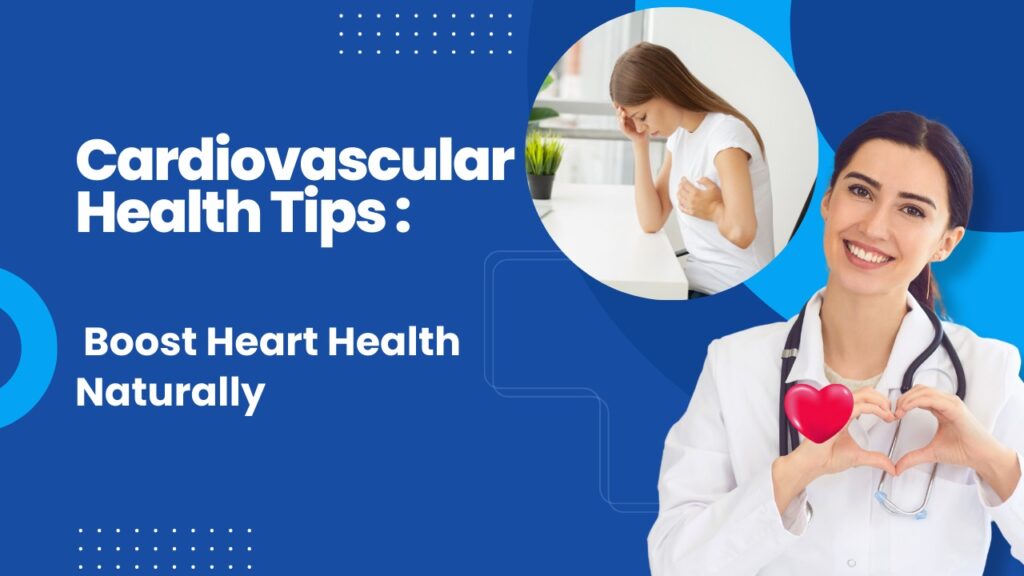The heart is more than a symbol of emotions—it’s a powerful organ that keeps us alive. It works nonstop to pump blood throughout the body, supplying oxygen and nutrients to every cell and removing waste. This constant flow is what keeps all body systems working properly and keeps us feeling energetic and strong.
However, heart health is often taken for granted. Cardiovascular diseases (CVDs) are the world’s leading cause of death, responsible for nearly 18 million lives lost each year, as reported by the World Health Organization. These conditions include heart attacks, strokes, and other serious complications that often result from poor lifestyle habits.
The positive news is that many heart diseases can be prevented. By making smart choices—like eating healthier foods, staying active, avoiding tobacco, and managing stress—you can lower your risk. These small changes add up, helping you protect your heart and live a longer, healthier life.
This article explores the top 8 cardiovascular health tips, offering a comprehensive look at how you can protect and even improve your heart function through nutrition, exercise, stress management, and more.
Top 8 Cardiovascular Health Tips
Eat a Heart-Healthy Diet

A well-balanced diet is one of the most important cardiovascular health tips you can follow. The food you eat directly impacts your heart’s function and overall well-being. Choosing the right foods can help maintain healthy blood pressure, reduce cholesterol levels, and support steady blood sugar.
A heart-healthy eating plan includes fruits, vegetables, whole grains, lean proteins, and healthy fats. These nutrient-rich foods provide your body with essential vitamins and minerals while helping to control inflammation and improve blood flow. Drinking plenty of water and limiting sugary drinks is also a key step toward better heart health.
Equally important is avoiding foods that can harm your arteries. Processed foods high in salt, sugar, and unhealthy fats increase the risk of heart disease. By following these cardiovascular health tips, you can strengthen your heart, lower disease risk, and enjoy a healthier life with long-lasting energy and vitality.
Key Recommendations:
Choose Whole Foods: Emphasize fruits, vegetables, whole grains, lean proteins, and healthy fats.
Limit Saturated and Trans Fats: Found in processed snacks, fried foods, and some animal products, these fats can raise LDL (bad) cholesterol and increase heart disease risk.
Reduce Sodium Intake: Excess salt contributes to high blood pressure—a major risk factor for heart attacks and strokes. Aim for less than 2,300 mg of sodium per day.
Include Omega-3 Fatty Acids: Found in fatty fish like salmon, flaxseeds, and walnuts, omega-3s help reduce inflammation and prevent clot formation.
Watch Your Sugar Intake: High levels of added sugars contribute to obesity, diabetes, and metabolic syndrome, all of which elevate cardiovascular risk.
Sample Heart-Healthy Meal:
Breakfast: Oatmeal topped with berries and a handful of walnuts
Lunch: Grilled chicken salad with olive oil vinaigrette and a side of quinoa
Dinner: Baked salmon, steamed broccoli, and sweet potato
Snack: Greek yogurt with chia seeds
Get Moving: Regular Physical Activity
Physical activity is one of the most effective cardiovascular health tips for keeping your heart strong and healthy. When you move your body regularly, you help your heart become more efficient at pumping blood. This improves blood circulation and ensures that oxygen and nutrients reach all parts of your body.
Exercise also plays a big role in maintaining a healthy weight. Being overweight increases the risk of heart disease, high blood pressure, and diabetes. By staying active, you can manage your weight more easily and reduce stress, which also benefits your heart.
Regular exercise doesn’t just prevent heart disease—it can even help reverse early signs of damage. Whether it’s brisk walking, cycling, swimming, or dancing, finding activities you enjoy makes it easier to stay consistent. Among the most important cardiovascular health tips is making movement a daily habit for long-term heart health and overall wellness.
Recommended Guidelines:
At Least 150 Minutes of Moderate-Intensity Exercise Weekly: Activities like brisk walking, cycling, or swimming are excellent choices.
Or 75 Minutes of Vigorous Activity: Running, aerobic dancing, or high-intensity interval training (HIIT) also benefit the heart immensely.
Include Strength Training: At least twice a week to build muscle and support metabolism.
Everyday Tips to Stay Active:
Take the stairs instead of the elevator.
Park farther from your destination and walk.
Try a standing desk or take short walk breaks during work hours.
Join group fitness classes or sports leagues for added motivation.

Maintain a Healthy Weight
Being overweight or obese puts extra strain on your heart and increases the chances of developing serious health problems. These include high blood pressure, high cholesterol, diabetes, and heart disease. Extra body fat—especially around the belly—can interfere with how your heart and blood vessels work.
One of the most helpful cardiovascular health tips is to aim for a healthy weight. Even losing just 5–10% of your body weight can lead to big health improvements. This small change can lower your blood pressure, reduce blood sugar levels, and improve cholesterol.
Weight loss doesn’t have to be extreme. Simple steps like eating balanced meals, staying active, and getting enough sleep make a real difference. Among all cardiovascular health tips, maintaining a healthy weight is one of the most powerful ways to protect your heart and support your overall well-being for years to come.
Weight Management Tips:
Track Your Calories and Macros: Use apps like MyFitnessPal to stay on top of your intake.
Avoid Fad Diets: Focus on sustainable, long-term habits rather than extreme restrictions.
Drink Plenty of Water: Staying hydrated supports metabolism and helps you feel full.
Mindful Eating: Pay attention to hunger and fullness cues, and avoid emotional eating.
Maintaining a healthy weight isn’t just about appearance—it’s about empowering your heart to function efficiently without undue stress.
Quit Smoking and Limit Alcohol Consumption

Smoking is one of the top preventable causes of heart disease. When you smoke, harmful chemicals enter your body and directly damage your blood vessels. This makes it harder for your heart to work properly and increases your risk of serious problems like heart attacks and strokes.
Tobacco smoke also reduces the amount of oxygen in your blood, making the heart work harder to supply the body with what it needs. It raises blood pressure and causes the blood to clot more easily, which can block arteries and lead to life-threatening conditions.
Among the most powerful cardiovascular health tips is to quit smoking completely. Your heart health can start improving soon after you stop. Combined with other cardiovascular health tips like regular exercise and healthy eating, quitting smoking is a key step toward a longer and healthier life.
Smoking Cessation Benefits:
Within 20 minutes: Blood pressure and heart rate drop.
Within 12 hours: Carbon monoxide levels normalize.
Within a year: Heart disease risk is cut in half.
Within 5 years: Stroke risk is that of a non-smoker.
Quitting smoking may be difficult, but resources like nicotine replacement therapy, counseling, and support groups can greatly increase success rates.
Alcohol and the Heart:
Moderation is Key: Excessive alcohol raises blood pressure, weakens heart muscles, and increases arrhythmia risks.
Limit Intake to: 1 drink per day for women, 2 drinks per day for men (as defined by the CDC: one drink = 5 oz wine, 12 oz beer, or 1.5 oz spirits).
While some studies suggest red wine may have cardiovascular benefits due to antioxidants like resveratrol, the risks of alcohol often outweigh the benefits. If you don’t already drink, there’s no need to start.
Manage Stress Effectively
Chronic stress can quietly harm your heart over time. When you’re stressed often, your body releases hormones like cortisol and adrenaline. These hormones raise your heart rate and blood pressure and may damage artery walls, especially if the stress continues for long periods.
One of the important cardiovascular health tips is learning how to manage stress in healthy ways. High stress levels can lead to inflammation and make it easier for fatty deposits to build up in your arteries—a condition called atherosclerosis. This increases your risk of heart attacks and other serious issues.
Relaxation techniques like deep breathing, meditation, regular exercise, and spending time with loved ones can help reduce stress. Among all cardiovascular health tips, taking care of your mental well-being is just as important as physical health. Lowering stress supports a stronger, healthier heart and improves your overall quality of life.
Healthy Ways to Manage Stress:
Practice Mindfulness or Meditation: Even 10 minutes a day can reduce stress hormone levels.
Exercise: Physical activity releases endorphins, the body’s natural mood elevators.
Journaling: Writing down your thoughts can offer clarity and emotional release.
Stay Connected: Regular social interaction with friends and family can act as a buffer against stress.
Get Creative: Engage in hobbies like painting, gardening, or music.
Recognizing stress triggers and developing coping strategies can protect your cardiovascular system from long-term damage.
Get Regular Health Screenings

You can’t manage what you don’t measure, especially when it comes to your heart. Regular health checkups are one of the most important cardiovascular health tips because they help catch problems early. Knowing your blood pressure, cholesterol, and blood sugar levels can alert you to risks before they become serious.
Many heart problems develop quietly over time without clear symptoms. By visiting your doctor regularly, you can monitor key health markers and take action if something starts to go off track. Early detection means you can make changes to your lifestyle and avoid long-term damage.
Among the top cardiovascular health tips is being proactive about your health. Don’t wait for warning signs—schedule routine checkups, ask questions, and keep track of your numbers. Staying informed and involved in your own health is a smart way to protect your heart and live a longer, healthier life.
Essential Screenings Include:
Blood Pressure: Aim for <120/80 mmHg.
Cholesterol Profile: LDL (“bad” cholesterol), HDL (“good” cholesterol), and triglycerides should be monitored regularly.
Blood Sugar Levels: Especially important if you have a family history of diabetes.
Body Mass Index (BMI): Healthy range is 18.5–24.9.
Waist Circumference: More than 40 inches for men or 35 inches for women increases heart disease risk.
Early detection of abnormalities allows for lifestyle changes or medical intervention to prevent the progression of heart disease.
Prioritize Quality Sleep
Sleep is the body’s natural reset button, helping it heal and restore energy. Getting enough quality sleep is essential for a healthy heart. Poor sleep has been linked to high blood pressure, weight gain, and higher blood sugar levels—all of which raise the risk of heart disease.
One of the often-overlooked cardiovascular health tips is making sleep a priority. Adults should aim for 7 to 9 hours of restful sleep each night. When you don’t get enough sleep, your body produces stress hormones that can strain your heart and lead to long-term health problems.
Among the most valuable cardiovascular health tips is creating a sleep-friendly routine. Avoid screens before bed, keep a regular schedule, and make your bedroom calm and quiet. Restful sleep helps your heart work better, reduces stress, and supports overall well-being.
Sleep Hygiene Tips:
Aim for 7–9 Hours of Sleep Per Night
Stick to a Regular Sleep Schedule: Go to bed and wake up at the same time every day.
Limit Screen Time Before Bed: Blue light disrupts melatonin production.
Create a Relaxing Bedtime Routine: Reading, gentle yoga, or meditation can help ease you into restful sleep.
Avoid Heavy Meals, Alcohol, and Caffeine Late in the Day
If you suffer from sleep apnea or chronic insomnia, consult a healthcare provider. Treating these conditions can significantly reduce cardiovascular risk.

Stay Hydrated and Limit Sugary Drinks
Water plays a key role in keeping your heart healthy. It helps maintain proper blood volume, supports kidney function, and keeps blood pressure in a healthy range. Staying hydrated ensures your heart doesn’t have to work harder to pump blood through the body.
One of the most practical cardiovascular health tips is to choose water over sugary drinks. Sugary beverages, like sodas and energy drinks, add extra calories and sugar to your diet. Over time, they can lead to weight gain, insulin resistance, and inflammation—factors that increase the risk of heart disease.
Among the best cardiovascular health tips is to make water your main drink. Try adding slices of fruit or herbs like mint if you want more flavor. Drinking enough water each day supports your heart, keeps your body in balance, and reduces your chances of developing serious health problems.
Hydration Tips:
Drink at Least 8 Glasses of Water Daily: More if you’re active or in hot climates.
Monitor Urine Color: Light yellow is a good sign of adequate hydration.
Carry a Reusable Water Bottle: This encourages regular sips throughout the day.
Avoid:
Sugary Sodas and Energy Drinks: Loaded with empty calories and often high in caffeine.
Fruit Juices: Even 100% juice can spike blood sugar—opt for whole fruits instead.
Flavored Coffees and Teas: Many contain as much sugar as a dessert.
Water keeps the cardiovascular system running smoothly, helping nutrients travel through the bloodstream and keeping your heart in optimal condition.
Conclusion

Taking care of your heart is one of the most important investments you can make for your long-term well-being. By embracing these top cardiovascular health tips, you empower yourself to reduce the risk of heart disease, increase your energy levels, and enhance your overall quality of life.
From eating nutrient-rich foods and staying active to managing stress and getting regular checkups, each tip offers a practical step toward a healthier heart. Remember, heart health is not about quick fixes—it’s about consistent, mindful choices that support your body’s most vital organ. You don’t have to overhaul your life overnight; even small changes, when sustained over time, can lead to significant benefits.
Prioritize your heart today by adopting these proven cardiovascular health tips and enjoy the peace of mind that comes with a stronger, more resilient heart. After all, a healthy heart supports a full and vibrant life.
FAQs
- What are the best cardiovascular health tips to follow daily ?
Focus on eating a balanced diet, exercising regularly, staying hydrated, managing stress, and getting enough sleep to support heart health. - How much physical activity is recommended for heart health ?
Aim for at least 150 minutes of moderate-intensity exercise, such as brisk walking, or 75 minutes of vigorous activity each week. - Can heart disease be reversed with lifestyle changes ?
In some cases, early signs of heart disease can be improved or even reversed with healthy habits like quitting smoking, improving diet, and exercising. - How does stress affect the heart ?
Chronic stress can raise blood pressure and increase inflammation, both of which can damage blood vessels and increase heart disease risk. - Why is sleep important for cardiovascular health ?
Poor sleep increases the risk of high blood pressure, weight gain, and heart disease, making quality sleep vital for a healthy heart.
